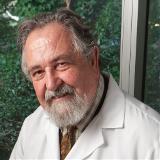 Donna & Benjamin M Rosen Chair
Donna & Benjamin M Rosen Chair
Steven M. Larson, MD., FACNM, FACR is currently the Donna and Benjamin M. Rosen Chair; Attending, Molecular Imaging and Therapy Service, Department of Radiology; Co-Leader, Imaging and Radiation Sciences, Member, Laboratory Head,
Molecular Pharmacology Program, Sloan Kettering Institute, Memorial Sloan Kettering Cancer Center. Dr. Larson’s primary expertise is in radiolabeled drug development and radiopharmacology of diagnostic imaging and therapy
in oncology using small molecules and monoclonal antibodies. Dual-boarded in nuclear medicine and internal medicine, his clinical skills center on oncology, cancer immunology, and clinical thyroid cancer. Dr. Larson has extensive
experience as an advisor to public and private institutions, having served, among other appointments, as a member of what is now the MEDI grant review committee of NIH, the DOE Office of Science Advisory Committee, and the
American Board of Nuclear Medicine, and as Chair of the Radiopharmaceutical Advisory Committee of the USFDA, Co-Chair of the National Research Council of the NAS Committee on Molybdenum-99 production with non-enriched Uranium
235, Chair of the Molecular Imaging Committee of RSNA, and Co-Chair of the Clinical Imaging Steering Committee of the NCI, and Chair of the NIH Clinical “Impact” Study Section, as well as a member of the Academy
of Medicine. Dr. Larson has received numerous awards for excellence in nuclear medicine, including the Hevesy Award, Cassen Prize, Wiley Prize (US FDA), and the Saul Hertz Award of the Society of Nuclear Medicine USA. He is
a member of the National Academy of Medicine of the National Academies of Science, USA